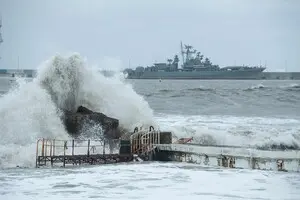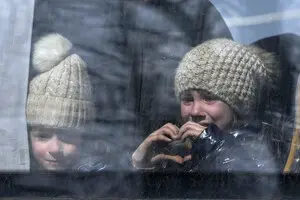Ukraine Holds Card in Russia Talks Trump May Take Away
“You don’t have the cards right now.” These words, President Trump told President Zelensky in the Oval Office, illustrate his perception of Ukraine's position in the war as a lost game. It’s not just an assessment of the current situation but a reflection of his approach: he believes Ukraine lacks leverage and cannot dictate terms to Russia.
In his push for a quick peace, the U.S. President seems willing to make any concessions and will pressure Ukraine to do the same, sacrificing even the cards Kyiv still has in its hand to quickly reset U.S.-Russia relations.
One outcome of Trump’s March call with Putin was the decision to hold “technical talks on a ceasefire in the Black Sea.” At the end of March, negotiations took place in Riyadh between the U.S. and delegations from both Russia and Ukraine.
Later, White House officials announced that the U.S. had reached agreements with Ukraine and Russia to ensure safe navigation, eliminate the use of force, and prevent the use of commercial vessels for military purposes in the Black Sea.
Ukraine’s Defense Forces have significantly degraded the combat capabilities of Russia’s Black Sea Fleet — destroying nearly one-third of its warships and missile carriers. To preserve what remains, a large portion of the fleet has been forced to relocate from Sevastopol and Feodosia in occupied Crimea to Novorossiysk and Ochamchira in mainland Russia.
Through these successful military operations, Kyiv secured its maritime route through the territorial waters of coastal states after Moscow withdrew from the UN-brokered “grain deal” in July 2023.
Now, without any deals with Russia, bulk carriers loaded with wheat are departing from Ukraine’s Black Sea ports.
Before the full-scale invasion, 95.6% of grain exports were shipped by sea. According to the Ukrainian Sea Ports Authority, in 2024, ports on the Danube and the Black Sea handled 60.3 million metric tons of grain, comparable to pre-war maritime shipping volumes. In the same year, the total cargo turnover through the maritime corridor reached 79.9 million metric tons, with exports accounting for 76.4 million metric tons.
Naturally, Moscow is eager to change a situation that has turned against it and knock the trump card out of Kyiv’s hands. The Kremlin is attempting to turn the talks into a tool of blackmail, pressuring Ukraine, the U.S., and the West as a whole to play by its rules and gradually eroding international support for Ukraine.
Moscow's strategy is to buy time and extract concessions from Washington, Brussels, and Kyiv—without taking on any real obligations. This is a war of attrition, where every compromise brings Ukraine closer to defeat.
In an effort to secure U.S. aid and win Trump’s support in his diplomatic standoff with Putin, Zelensky announced that Ukraine had agreed not to use military force in the Black Sea.
However, even after Kyiv agreed to a ceasefire, a formal deal for a temporary and partial truce in the region was never reached. It remains unclear whether such an agreement will ever be signed.
One reason for this is the list of "5–6 conditions" set by the Kremlin as prerequisites for implementing a ceasefire in the Black Sea.
Among Russia's demands are:
- Lifting sanctions on Russia’s Agricultural Bank (Rosselkhozbank) and reconnecting it to the SWIFT system;
- Removing sanctions on companies that produce and export food and fertilizers, as well as lifting restrictions on insurance companies working with food and fertilizer shipments;
- Lifting the ban on visiting ports, removing restrictions on ship services in ports, and lifting sanctions imposed on vessels under the Russian flag;
- Lifting sanctions on the supply of agricultural machinery to Russia, as well as other goods used in food and fertilizer production.
What’s clear is that Moscow is trying to undermine the West’s sanctions system against Russia through a ceasefire in the Black Sea.
Additionally, by demanding the lifting of sanctions on Rosselkhozbank, companies, and vessels, the Russians are testing what concessions Putin can get from Trump in exchange for a quick signing of a peace deal between Ukraine and Russia.
Success in reconnecting Rosselkhozbank to SWIFT would signal that further easing of Western sanctions might be possible.
In Washington, officials say they are willing to consider Russia's demands to establish a ceasefire in the Black Sea. But is such a ceasefire in Ukraine’s best interest?
For Kyiv, halting Russian drone and missile strikes not only on Ukrainian Black Sea ports but also on cities more broadly is crucial, as the port infrastructure is being destroyed, commercial vessels are damaged, and people are dying.
However, the terms for a ceasefire in the Black Sea are extremely unfavorable for Ukraine. Moreover, there are risks that extend beyond the potential weakening of the sanctions regime against Russia.
“Trump has already weakened our negotiating position by stating that Ukraine can forget about NATO membership and that a return to the 1991 borders is unrealistic. The Black Sea is one of Kyiv's few trump cards in negotiations with Moscow,” Oleksandr Khara, director of Kyiv-based Center for Defense Strategies, told ZN.UA.
“We have found ways to strip Russia of its advantage in the waters. And now there is a threat that the Kremlin will regain its position thanks to Trump's 'goodwill' gestures.”
Firstly, even without lifting sanctions against Rosselkhozbank, there are risks that the Russians will seek to impose unfavorable ceasefire terms in the Black Sea, particularly regarding a new “grain deal.”
For example, they might push for the right to inspect ships heading to Ukrainian ports, as was mentioned in the Kremlin's statement following talks in Riyadh.
During the “grain deal,” the Russians deliberately delayed inspections, hindering the passage of bulk carriers and employing tactics that had been well-established in the Azov Sea since 2015.
Secondly, if sanctions on the supply of goods used in food and fertilizer production to Russia are lifted, some of these chemicals may be used not only for the production of phosphoric flour or potassium nitrate but also for making incendiary shells and gunpowder.
Thirdly, there are concerns that the Russians will not adhere to the ceasefire regime in the Black Sea and will continue striking port infrastructure and civilian vessels in the ports. According to the Center for Countering Disinformation, Ukraine’s governmental agency, “within 15 days of the 'energy ceasefire,' the Russian forces killed more Ukrainians than in the same period before.” Meanwhile, from March 18 to April 9, Russia launched nine attacks on Ukraine's energy facilities. There is no reason to believe the situation would change even if a ceasefire were agreed upon in the Black Sea.
Khara, an expert, said that since Trump is eager to secure a swift peace agreement between Ukraine and Russia to shift focus to China, the U.S. president “will overlook violations by Moscow but will react sharply to any potential violations by Kyiv.”
Moreover, it is important not to overlook another aspect of Trump’s character—his tendency to create an alternative reality that suits him. If, under the ceasefire regime in the Black Sea, striking of Ukrainian coastal cities and ports continues, and if the imagined scenario doesn’t match the reality, the U.S. President will simply ignore the uncomfortable truth.
Remember his remark about not being able to believe he called Zelensky a dictator? "Did I say that? I can't believe I would say that," Trump said when asked whether he still considers Zelensky a "dictator.”
Fourthly, there is a risk that under a prolonged ceasefire in the Black Sea, Turkey may open the Bosporus and Dardanelles to allow Russian warships into the Black Sea.
This would enable Russia to significantly strengthen the military power of its Black Sea Fleet and increase the number of missile carriers.
When Russia unleashed its full-scale invasion of Ukraine, Ankara closed the Black Sea Turkish straits to military vessels in accordance with the Montreux Convention.
Fifthly, Moscow may decide to return its warships to bases in occupied Crimea.
“The return of the Black Sea Fleet to Sevastopol would hold more symbolic than military value for Russia. Warchips based in Novorossiysk continue to sail out to sea, launching Kalibr cruise missiles at our cities,” Andrii Ryzhenko, a former deputy chief of staff of the Ukrainian Navy, told ZN.UA.
In fact, just a few days ago, Russia struck Ukraine with missiles launched from the Black Sea.
Furthermore, if the Turkish straits were to remain open, it would enable Russia to bolster its presence in the Mediterranean, the Middle East, and North Africa. This development would certainly be concerning for Turkey and Israel, as well as the European Union, which has already grappled with a major crisis related to waves of refugees caused by heavy bombings of Syrian cities.
Sixthly, Russia could use the ceasefire to advance closer to maritime communication lines and mine the routes to Ukrainian port infrastructure and the "grain corridor," as well as threaten the major Black Sea port city of Odesa and other cities from a closer range.
This is why Defense Minister Rustem Umerov warned that any movement of Russian warships beyond the eastern Black Sea would be considered a threat to navigation and national security. In such a case, Ukraine would exercise its right to self-defense.
Ukraine must also warn that the use of a set of oil drilling platforms for military purposes, including the installation of reconnaissance equipment to monitor air, surface, and underwater activities, will be prevented by all available means.
If a ceasefire in the Black Sea is inevitable, then it is in Kyiv's interest to minimize risks and set several non-negotiable conditions for the agreement.
Firstly, Moscow must commit to halting all missile and drone attacks on Ukrainian ports and the vessels docked there.
Secondly, if Ukraine agrees not to target Russian Black Sea Fleet ships, boats, submarines, and aircraft, Moscow must also commit not to use its fleet's weapons to strike any Ukrainian sites or territorial waters.
Thirdly, Ukraine’s ports in Mykolaiv, Ochakiv, and Kherson, which remain blocked, must be reopened.
Fourthly, Russian warships should follow direct routes to the straits, avoiding sailing along the Ukrainian coastline as they did before the full-scale invasion.
The future agreement must clearly define the meridian that Russian warships and border guard boats are prohibited from crossing. And, of course, Russia must not be allowed to inspect civilian vessels heading to or from Ukrainian ports.
Ukraine has already proven its ability to control the situation in the Black Sea without formal agreements with the aggressor. Any ceasefire terms that favor Russia will not only undermine Ukraine's position but also weaken the West's sanctions policy, enabling Moscow to rebuild and strengthen its military capabilities in the Black Sea.
This is why Kyiv must insist on a comprehensive agreement with strict conditions and international guarantees. Without such terms, the "ceasefire" in the Black Sea risks becoming nothing more than a brief respite before a new offensive.
Please select it with the mouse and press Ctrl+Enter or Submit a bug


















 Login with Google
Login with Google